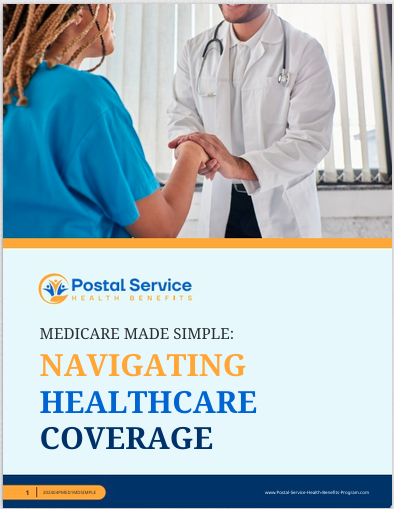Key Takeaways
-
Medicare Part A may be premium-free for most, but it does not mean it’s cost-free. You still face potential out-of-pocket expenses, including a 2025 hospital deductible of $1,676 and daily coinsurance costs for longer stays.
-
If you’re relying on PSHB as your main health coverage, understanding how it interacts with Medicare Part A is essential. Knowing your benefits ahead of time can help prevent financial surprises during hospital stays.
What Medicare Part A Covers—and What It Doesn’t
Medicare Part A, often referred to as hospital insurance, provides coverage for inpatient hospital care, skilled nursing facility (SNF) care, some home health services, and hospice. While it serves as a foundational benefit for many retired Postal Service annuitants, its limitations can be significant if you’re unprepared.
Covered Services Under Part A
-
Inpatient hospital care (after formal admission)
-
Skilled nursing facility care (following a qualifying hospital stay)
-
Hospice care for terminal illnesses
-
Limited home health services related to recovery
These benefits, while comprehensive at a glance, include conditions, limitations, and cost-sharing that may surprise you.
What’s Not Covered
-
Outpatient services (these fall under Part B)
-
Most prescription drugs while in a hospital (unless they are part of inpatient treatment)
-
Personal care items and private-duty nursing
-
Long-term custodial care
If you’re hospitalized and assume everything is paid for under Part A, you may be unpleasantly surprised when bills start arriving for services Medicare doesn’t fully cover.
Hospital Stays: The Cost Breakdown for 2025
Many Postal Service retirees feel secure knowing they have Medicare Part A. But understanding how billing works during hospitalization is critical.
Inpatient Hospital Costs in 2025
-
Deductible: $1,676 per benefit period.
-
Coinsurance:
-
Days 1–60: $0 coinsurance
-
Days 61–90: $419 per day
-
Days 91–150 (lifetime reserve days): $838 per day
-
After 150 days: You pay all costs
-
A benefit period starts when you’re admitted to a hospital and ends after 60 consecutive days without inpatient care. You could face multiple benefit periods—and multiple deductibles—in a single year.
Skilled Nursing Facility Costs
After a qualifying hospital stay of at least three days:
-
Days 1–20: $0 coinsurance
-
Days 21–100: $209.50 per day
-
After 100 days: You pay all costs
Many patients don’t realize SNF coverage requires daily skilled care. Routine help with bathing or dressing doesn’t qualify, and Medicare won’t pay for custodial care beyond what’s medically necessary.
How PSHB Coordinates With Medicare Part A
When you’re enrolled in both PSHB and Medicare Part A, the coordination of benefits determines who pays first.
-
If you’re retired and enrolled in Medicare, Medicare generally pays first, and PSHB serves as your secondary payer.
-
If you’re still actively working for USPS, PSHB pays first, and Medicare acts as a backup.
Understanding the primary vs. secondary payer rules is essential to avoid rejected claims or delayed reimbursements.
PSHB and Cost-Sharing Relief
Many PSHB plans help cover deductibles and coinsurance when Medicare is the primary payer. However, this varies by plan. For example:
-
Some plans reduce or waive the hospital deductible.
-
Others limit your out-of-pocket exposure for inpatient stays.
-
Not all plans cover services excluded by Medicare.
Your benefits will depend on the specifics of your chosen PSHB plan. Review your plan brochure closely during the Open Season, which takes place each year from November to December.
Why Observation Status Could Be a Costly Surprise
Even if you’re in a hospital bed overnight, you may not be officially “admitted.” Instead, the hospital may list you under observation status, which is considered outpatient care.
This matters because:
-
Observation care is billed under Medicare Part B, not Part A.
-
You may not qualify for SNF coverage afterward.
-
You could be billed for medications or services not fully covered by Part B.
If you’re unsure of your admission status, ask the hospital staff directly. Clarifying this could help you avoid unexpected charges and complications with follow-up care.
Common Misunderstandings That Lead to Large Bills
Medicare Part A is widely misunderstood. Many annuitants make assumptions that lead to costly gaps in coverage. Avoid these common errors:
1. Assuming Medicare Covers Everything
Medicare only pays for covered services. Anything outside the defined inpatient services or SNF rules will result in out-of-pocket expenses. Relying solely on Medicare without understanding the exclusions can be risky.
2. Overlooking Benefit Periods
Each benefit period can reset your deductible and cost-sharing. Multiple hospitalizations in a year can lead to repeated charges—each with a new $1,676 deductible in 2025.
3. Failing to Enroll in Medicare Part B
While Part A is usually automatic and premium-free, Part B requires a separate enrollment and monthly premium. Without Part B, you may miss out on vital outpatient coverage. If you’re enrolled in PSHB, skipping Part B could reduce your plan’s benefits.
4. Ignoring PSHB Plan Coordination
Not all PSHB plans handle Medicare the same way. Some offer better wraparound coverage than others. If you fail to match your PSHB choice to your Medicare enrollment, you could miss out on valuable cost protections.
Key Hospital Planning Tips for PSHB Members
Being proactive can prevent many of the billing shocks that retirees experience.
Understand Your Status Before Admission
Ask the hospital if you are being admitted as an inpatient or placed under observation. This affects not only your billing but also your eligibility for SNF coverage.
Always Carry Both ID Cards
When receiving care, show both your Medicare and PSHB insurance cards. This helps ensure providers bill the correct insurer first.
Review Your Explanation of Benefits (EOB)
After a hospital stay, check your EOBs from both Medicare and PSHB. Ensure that claims have been correctly processed and that any denied services are legitimate.
Contact Your Plan During Hospitalization
If you’re hospitalized for an extended period, contact your PSHB plan’s customer service. They can explain how benefits apply and whether any pre-approvals or documentation are needed.
Why It Matters for Your Financial Health
Healthcare costs during retirement can escalate quickly—especially when hospitalization is involved. Even a short stay can lead to thousands in out-of-pocket costs if you’re unprepared.
Understanding Medicare Part A’s structure is only part of the equation. You must also:
-
Understand your PSHB plan’s role
-
Know how Medicare and PSHB share costs
-
Recognize when extra coverage is needed to fill Medicare’s gaps
This level of preparation ensures that you’re not just covered in theory—but protected in practice.
Don’t Let Hospital Charges Catch You Off Guard
Hospital visits are stressful enough without the added worry of unclear billing or denied coverage. If you’re enrolled in PSHB and eligible for Medicare, it’s vital to understand:
-
The exact scope of Medicare Part A coverage
-
The interaction between Medicare and your PSHB plan
-
The cost implications of each hospitalization phase
Make time this year to review your plan documents and understand what you’re really paying for. And if you need help evaluating how your PSHB coverage works with Medicare Part A, get in touch with a licensed agent listed on this website for professional advice tailored to your situation.






